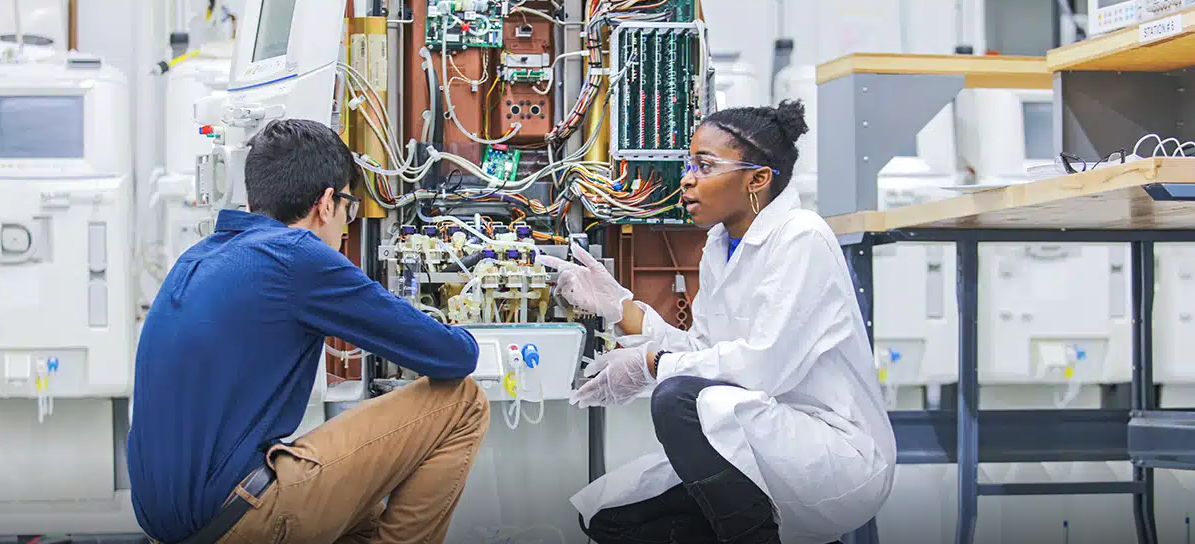Now Reading: Finding the Best Schools for Biomedical Engineering
-
01
Finding the Best Schools for Biomedical Engineering
Finding the Best Schools for Biomedical Engineering

Choosing a college major is a huge decision, and when you’re interested in a field as exciting as biomedical engineering, you want to make sure you find the right program. This field combines engineering principles with medical science to design and create products that improve human health. Think of things like prosthetic limbs, artificial organs, and advanced medical imaging equipment. To get started on this innovative career path, you need a top-notch education. This guide will walk you through some of the best schools for biomedical engineering, helping you understand what makes a program great and what to look for on your college search.
Key Takeaways
- Top-Tier Programs: Universities like Johns Hopkins, MIT, and Georgia Tech consistently rank as the best schools for biomedical engineering due to their extensive research, renowned faculty, and strong industry connections.
- What to Look For: When choosing a school, consider factors beyond rankings, such as research opportunities, specialization options, campus culture, and access to internships.
- Curriculum is Key: A strong biomedical engineering program will have a solid foundation in math and science, combined with specialized courses in areas like biomechanics, biomaterials, and bioinstrumentation.
- Career Outlook: Graduates from top programs have excellent career prospects in medical device manufacturing, pharmaceuticals, research, and even medicine.
What is Biomedical Engineering?
Before diving into the schools, let’s quickly touch on what biomedical engineering is all about. At its core, this discipline uses engineering skills to solve problems in biology and medicine. It’s a broad field with many specializations, but the ultimate goal is to improve healthcare and quality of life.
Biomedical engineers might work on:
- Developing new diagnostic tools to detect diseases earlier.
- Designing advanced artificial hips and knees.
- Creating systems to deliver drugs to specific parts of the body.
- Engineering tissues and organs for transplantation.
It’s a field that requires creativity, strong analytical skills, and a genuine passion for helping people. If that sounds like you, then finding one of the best schools for biomedical engineering is your next important step.
Top Universities for Biomedical Engineering in the US
While many universities offer excellent programs, a few consistently stand out for their leadership in the field. These institutions are known for their groundbreaking research, distinguished faculty, and impressive resources.
Johns Hopkins University (JHU)
Often cited as the number one program in the country, the Department of Biomedical Engineering at Johns Hopkins is a powerhouse. It operates as a joint department between the Whiting School of Engineering and the world-renowned School of Medicine. This close relationship provides students with unparalleled access to clinical environments and cutting-edge medical research. Students at JHU are encouraged to start research early, and the curriculum is designed to be flexible, allowing for specializations in areas like computational medicine and neuroengineering. The hands-on design team projects are a core part of the experience, preparing students for real-world challenges.
Georgia Institute of Technology (Georgia Tech)
Georgia Tech’s program, the Wallace H. Coulter Department of Biomedical Engineering, is a unique partnership with Emory University’s School of Medicine. This collaboration gives students access to the resources of both a top public engineering school and a leading private medical institution. The program is huge, which means there are vast research opportunities and a wide array of specializations. Georgia Tech is particularly strong in areas like medical device design, biomechanics, and tissue engineering. Its location in Atlanta, a growing hub for biotech and healthcare, also provides students with excellent internship and networking opportunities.
Massachusetts Institute of Technology (MIT)
It’s no surprise that MIT is on this list. Known for its rigorous and innovative approach to all things engineering, its biomedical engineering program is no exception. MIT emphasizes a deep, fundamental understanding of engineering principles and applies them to complex biological problems. The research culture at MIT is intense and exciting, with students often working alongside faculty who are leaders in their fields. The university is known for fostering an entrepreneurial spirit, and many students go on to launch their own startups in the biotech space. If you are looking for one of the best schools for biomedical engineering with a focus on invention and discovery, MIT is hard to beat.
What Makes a Great Biomedical Engineering Program?
Rankings are a helpful starting point, but they don’t tell the whole story. When you’re searching for the right fit, you need to dig deeper and look at the specific qualities of each program.
Curriculum and Specializations
A strong program will have a robust core curriculum covering calculus, physics, chemistry, and biology, alongside fundamental engineering courses. But the best programs go further, offering a variety of specializations. You might want to focus on a particular area, so check if a school offers tracks in:
- Biomechanics: The study of movement and structure in biological systems.
- Biomaterials: The development of materials that can safely interact with the human body.
- Bioinstrumentation: The design of devices for diagnosis and treatment, like EKG machines.
- Cellular and Tissue Engineering: Growing tissues and organs in a lab.
- Computational Biology: Using data and computers to understand biological systems.
Choosing a school with a specialization that excites you can make your educational experience much more rewarding and prepare you for a specific career path.
Research Opportunities and Labs
Biomedical engineering is a research-driven field. The best programs provide ample opportunities for undergraduate students to get involved in research. Working in a lab allows you to apply what you’ve learned in the classroom to real-world problems. It also helps you build a close relationship with faculty members and can lead to publications or presentations at conferences. When visiting a campus or exploring a university’s website, look for information on undergraduate research programs. See what kind of labs they have and what projects professors are currently working on.
Faculty and Mentorship
The quality of the faculty is a crucial component of any top program. You want to learn from professors who are not only great teachers but also active researchers who are respected in the field. Look at the faculty profiles on the department’s website. Have they won awards? Are they widely published? More importantly, great programs foster a culture of mentorship, where professors are accessible and invested in their students’ success. This guidance can be invaluable as you navigate your coursework and plan your career.
Other Excellent Schools to Consider

Beyond the top three, many other universities offer fantastic biomedical engineering programs. These schools may offer unique strengths, a different campus environment, or a lower cost of attendance.
|
University |
Key Strengths |
|---|---|
|
Duke University |
Strong focus on research, close ties to Duke University Medical Center, popular design-focused curriculum. |
|
Stanford University |
Located in Silicon Valley, excels in bio-design and entrepreneurship, interdisciplinary approach. |
|
University of California, San Diego (UCSD) |
A leader in tissue engineering and regenerative medicine, located in a major biotech hub. |
|
University of Michigan |
Top-ranked public university, offers a wide range of BME concentrations and global opportunities. |
|
Rice University |
Known for hands-on learning, strong in global health technologies and medical device design. |
How to Choose the Right School for You
Finding the best schools for biomedical engineering is also about finding the best school for you. Think about what kind of environment you thrive in. Do you prefer a large public university with big sports teams or a smaller, private college with a more intimate feel? Consider the location. Do you want to be in a bustling city with lots of biotech companies or a more traditional college town?
Visit campuses if you can. Talk to current students and ask them about their experiences. What do they love about the program? What do they wish was different? Your personal fit with the campus culture is just as important as the academic rankings. As you do your research, you might find valuable insights on platforms like those discussed at forbesplanet.co.uk that cover educational and career trends.
Preparing for a Biomedical Engineering Major in High School
If you’re still in high school, you can start preparing now to be a strong applicant for these competitive programs.
Focus on STEM Courses
Take as many advanced math and science courses as you can. This includes:
- AP Calculus AB and BC
- AP Physics 1, 2, and C
- AP Chemistry
- AP Biology
Excelling in these subjects shows admissions committees that you have the foundational knowledge to succeed in a rigorous engineering curriculum.
Get Hands-On Experience
Look for opportunities to engage with engineering and science outside the classroom. Join a robotics club, participate in a science fair, or look for summer programs or camps focused on STEM. Some hospitals even have volunteer programs for high school students, which can give you a glimpse into the clinical environment where biomedical engineering solutions are used. This type of experience demonstrates your passion and initiative.
The Future of Biomedical Engineering
The career outlook for biomedical engineers is incredibly bright. The U.S. Bureau of Labor Statistics projects that employment in this field will grow faster than the average for all occupations. As our population ages and the demand for advanced medical treatments and technologies increases, the need for skilled biomedical engineers will continue to rise.
Graduates from the best schools for biomedical engineering find jobs in a variety of industries, including:
- Medical device manufacturing
- Pharmaceutical companies
- Hospitals and research facilities
- Government regulatory agencies (like the FDA)
- Consulting
Many biomedical engineering graduates also go on to pursue advanced degrees, including a master’s, Ph.D., or even medical school. A BME degree provides an excellent foundation for a career as a physician.
Conclusion
The journey to becoming a biomedical engineer starts with a great education. The best schools for biomedical engineering, like Johns Hopkins, Georgia Tech, and MIT, offer a powerful combination of rigorous academics, groundbreaking research, and invaluable connections. However, the “best” school is ultimately the one that aligns with your personal interests, learning style, and career goals. By looking beyond rankings to consider curriculum, research opportunities, and campus culture, you can find the perfect program to launch your career in this exciting and impactful field. Start exploring, ask questions, and get ready to engineer the future of medicine.
Frequently Asked Questions (FAQ)
Q1: What is the average salary for a biomedical engineer?
A1: Salaries can vary based on location, experience, and industry. However, according to the U.S. Bureau of Labor Statistics, the median annual wage for biomedical engineers was $101,020 in May 2023. Entry-level positions typically start lower, while senior engineers in management can earn significantly more.
Q2: Is biomedical engineering a good major for pre-med students?
A2: Yes, it’s an excellent choice. The curriculum covers many of the science prerequisites for medical school, and the engineering problem-solving approach is highly valued. A BME degree also provides a fantastic backup plan if you decide not to pursue medicine.
Q3: How difficult is a biomedical engineering degree?
A3: Biomedical engineering is considered one of the more challenging engineering disciplines. It requires a strong aptitude for math and science and involves a heavy course load. However, for students who are passionate about the subject, the challenging work is often very rewarding. The best schools for biomedical engineering provide support systems like tutoring and study groups to help students succeed.
Q4: Do I need a graduate degree to work as a biomedical engineer?
A4: A bachelor’s degree is the typical entry-level requirement for most biomedical engineering jobs, especially in the medical device industry. However, for positions in research and development or for those who wish to lead projects, a master’s degree or Ph.D. is often preferred and can lead to higher-level opportunities.
















